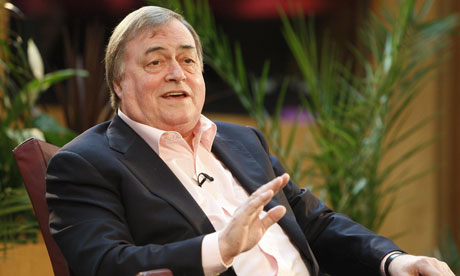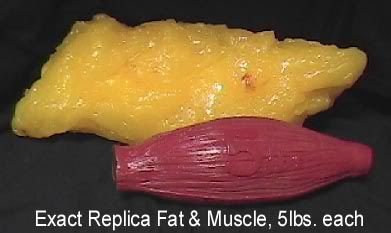Does muscle really weight more than fat?
Replies
-
So. When all is said and done, is muscle heavier than fat....?
Yes, because Weight = (Density x Volume) x Gravity. Gravity is constant because we are all on Earth, so if we hold volume constant, and we all agree that muscle is denser than fat, then the outcome is an increased weight.0 -
yes, muscle is heavier than fat. look at the pic dixiejo posted above. the same volume of muscle will weigh more than the same volume of fat. that is why it is better to rely on body measurements instead of body weight when trying to "lose weight."
when you first start working out, you can't get discouraged that your weight isn't heading in the correct direction. your body will eventually head in the right direction, considering that you weren't working out before and are hopefully eating better or at least the same as you were before. if you were sitting on the couch eating cheetos all day and now you do the exact same thing but add an hour at the gym, you will be in better shape than you were without the gym.0 -

CAN THERE BE A STICKY ON THIS?0 -
Hahaha Mcrow I was waiting for this.

Getcha popcorn ready!0 -
It's water retention. Your body needs excess water to repair muscle and to store it along with glycogen in the liver and muscle for the next "anticipated" workout. It's normal and can last up to a couple of weeks till your body adapts.I started with a personal trainer a few weeks ago. My first week i lost 3-1/2#'s, now this week he has been working me really hard strength training and I show i'm up 2#'s and there's no way I should be up considering my diet and just the sweating alone. It discouraged me. A co-worker said it could be muscle gain but I don't buy it. i'm sticking with it no matter what, maybe i'm just retaining water. I'll be drinking it like a fish the next week.
So my question, is it possible it's muscle gain.????
And if you're on calorie deficit, this whole BS of "you're gaining muscle" is really just BS. To gain muscle, you need to have a caloric SURPLUS. It's possible to gain a little muscle if you've never strength trained before, but it would be minute. The best trainers who try to put on muscle are lucky to add 1lb of lean muscle a month even with spot on nutrition.
^^ This is exactly correct.0 -
Also, 1 inch squared of muscle weighs more than 1 inch squared than fat.
1 lb is 1 lb.
However the size of 1 lb of muscle is much smaller than 1 lb of fat. -- does that make sense?0 -
So. When all is said and done, is muscle heavier than fat....?
Glad you asked that question Sarah
As you can see in this picture, the 250 lbs. of fat is much bulkier than the 250 lbs. of muscle… A 250 pound pile of fat will take up more space (volume) than a 250 pound pile of muscle. A woman weighing 150 pounds with 19% fat will look much smaller (and be much healthier) than a woman at 150 pounds with 35% fat. They weigh the same, yet the composition is different. Because muscle is denser than fat, the person with less fat and more muscle will look smaller. Once you understand this, you will stop being so concerned with body weight and start paying attention to body composition. How much body fat do you have compared to muscle?
 0
0 -
Chances are that half of the weight lost in the first week was water; it may be coming back as your body adjusts to your new routine.
You probably are putting on muscle. And a pound of muscle will take up less space that a pound of fat, look better, and boost your metabolism. But it would take an awful lot to gain 2 lbs of muscle in just one week.
Good for you for sticking with it! As your body adjusts and you keep going, you will start seeing the results you're working for. Remember, you didn't gain the body you have now in a week or a month ... don't expect to have a fit, healthy body too quickly either.0 -
So. When all is said and done, is muscle heavier than fat....?
Glad you asked that question Sarah
As you can see in this picture, the 250 lbs. of fat is much bulkier than the 250 lbs. of muscle… A 250 pound pile of fat will take up more space (volume) than a 250 pound pile of muscle. A woman weighing 150 pounds with 19% fat will look much smaller (and be much healthier) than a woman at 150 pounds with 35% fat. They weigh the same, yet the composition is different. Because muscle is denser than fat, the person with less fat and more muscle will look smaller. Once you understand this, you will stop being so concerned with body weight and start paying attention to body composition. How much body fat do you have compared to muscle?
[img]http://static.guim.co.uk/sys-images/Sport/Pix/columnists/2010/9/10/1284132133227/John-Prescott-006.jpg [\img][/img][img]http://www.anorak.co.uk/wp-content/uploads/john_prescott.jpg [\img][/img]
You could talk me in to bed any day shweeeeeedeart............0 -
There's just no helping some people.
To answer the poster's original question, no. Absolutely, postitively no way. Your friend is talking rubbish. My money's on the original weeks weight loss was mostly water, which your body has now made you drink.
And Heather, I hope you're playing Poe.0 -
Thanks everyone, my first week was just my first week training, i've been doing this a year come Sept. and was stcu for 4 months with no weight loss, so I decided to hire a trainer. I'm not sure the first week was water loss but the boost in activity, either way, i'm sure it will balance out and I'll start moving the scale again. I'm not going to worry about it, just going to continue.
Thank you all!!!0 -
Good Lord...Lets just put a picture on here to illustrate it.
[img/]http://i2.photobucket.com/albums/y24/dumbfox/FatvsMuscle.jpg[\img]
Those are both 1 lb worth of muscle and fat (respectively). 1lb of muscle is smaller (almost by half) than the fat. They have the same mass, but different densities.0 -
Good Lord...Lets just put a picture on here to illustrate it.
[img]http://i2.photobucket.com/albums/y24/dumbfox/FatvsMuscle.jpg[\img] Those are both 1 lb worth of muscle and fat (respectively). 1lb of muscle is smaller (almost by half) than the fat. They have the same mass, but different densities.[/img]
tried to fix it for you...maybe not0 -
Thanks everyone, my first week was just my first week training, i've been doing this a year come Sept. and was stcu for 4 months with no weight loss, so I decided to hire a trainer. I'm not sure the first week was water loss but the boost in activity, either way, i'm sure it will balance out and I'll start moving the scale again. I'm not going to worry about it, just going to continue.
Thank you all!!!
It certainly will!
Plus when you do finally start to get stronger, the extra muscle will aid fat loss. Don't listen to the people above that don't care what sort of weight they lose.0 -
On MFP? Never. Reminds me, I think I saw a topic about eating your exercise calories...haven't heard about that yet, I need to check it out...I feel like I'm experiencing deja vous.... again.
best emoticon ever0 -
I started with a personal trainer a few weeks ago. My first week i lost 3-1/2#'s, now this week he has been working me really hard strength training and I show i'm up 2#'s and there's no way I should be up considering my diet and just the sweating alone. It discouraged me. A co-worker said it could be muscle gain but I don't buy it. i'm sticking with it no matter what, maybe i'm just retaining water. I'll be drinking it like a fish the next week.
So my question, is it possible it's muscle gain.????
Back to your post name, a cup of muscle (meat) weighs more than a cup of fat, yes. For your post topic specifically, women can only gain about 2.5 pounds of muscle per month. I do not think your fluctuation is due to muscle build, but rather water weight or other variables, look at your sodium, what were the conditions of your weighing (best is first thing in the morning, naked, before you eat, after you void, scale always in the same spot).0 -
I totally meant to say a pound of fat is larger than a pound of muscle lol!Just water retention so that your muscles can repair themselves....it'll go away. And a pound of muscle and pound of fat both weigh a pound, but a pound of fat is larger (occupies more space) than a pound of fat.
 0
0 -
Thanks for this. I've read it before and this only backs what some of "in the know" people say about gaining muscle on calorie deficit.WIth regard to the eternal "can you build muscle whilst on a calorie deficit" question the answer is yes, but only in specific circumstances.
In the Wallace study (Wallace, M.B., Mills, B.D., & Browning, C.L. (1997). Effects of cross training on markers of insulin resistance/hyperinsulinemia) a group of 8 men lost an average of 16.3 lbs of fat whilst gaining 9.5 lbs of lean mass under clinical observation over a 14 week period.
However, it should be noted that these men were borderline obese with BF% of around 27 and new to training. Also, the figures cited were an average: some lost more and some less due to genetic factors. In addition, whether this rate of fat loss and lean mass gain would carry on at such a rate once their bodies had adapted to the training is highly dubious.
Other circumstances include where an individual can lose fat whilst gaining lean mass are formerly athletic individuals coming back to training after a layoff. However, their figure will be nothing like the above.
If you don't fall into the above categories then it is highly unlikely you can gain lean mass at the same time losing fat whilst on a calorie deficit.
Like the vast majority of questions in fitness this one is individual specific.
ETA: in the Wallace study the water displacement method was used to calculate changes in lean mass (thank you Archimedes...) This is subject to error but better than most methods.0 -
Back to saying the building muscle on a calorie deficit isn't likely. You need a surplus.There is a time when you are building muscle and the muscle is coming on to your body faster than you are burning the fat. You can sometimes see an increase in weight during this time, but at the same time, you can see inches coming off of your body because the muscle is more dense. As you gain muscle, it is more effective at burning calories than fat, and you will eventually see the fat burning faster because of your increase in muscle. Everybody's body is different, so the pace this happens for you will be different than for me, your cousin, or someone else on this site.
A pound of muscle is about 600 calories. If you broke that up into strictly protein grams it would be 150 grams. That would mean you would have to ingest 150 grams of protein extra ABOVE what your normal protein intake is and have it all convert to gain a pound of pure muscle. Carbs and fats DO NOT BUILD MUSCLE. You cannot convert carbs or fats into protein.
We are now also talking about converting that 150 grams into pure muscle, which isn't likely. Some of it will be excreted out of the body. And adding muscle will usually mean adding about .3 pounds of fat or more.
So let's dispell this myth that people are building muscle while they are working out and on a calorie deficit.0 -
Back to saying the building muscle on a calorie deficit isn't likely. You need a surplus.There is a time when you are building muscle and the muscle is coming on to your body faster than you are burning the fat. You can sometimes see an increase in weight during this time, but at the same time, you can see inches coming off of your body because the muscle is more dense. As you gain muscle, it is more effective at burning calories than fat, and you will eventually see the fat burning faster because of your increase in muscle. Everybody's body is different, so the pace this happens for you will be different than for me, your cousin, or someone else on this site.
A pound of muscle is about 600 calories. If you broke that up into strictly protein grams it would be 150 grams. That would mean you would have to ingest 150 grams of protein extra ABOVE what your normal protein intake is and have it all convert to gain a pound of pure muscle. Carbs and fats DO NOT BUILD MUSCLE. You cannot convert carbs or fats into protein.
We are now also talking about converting that 150 grams into pure muscle, which isn't likely. Some of it will be excreted out of the body. And adding muscle will usually mean adding about .3 pounds of fat or more.
So let's dispell this myth that people are building muscle while they are working out and on a calorie deficit.
You can, as long as you are training properly eating properly, and have enough body fat reserves. I actually did this. I was obese, on a caloric deficit and used a heavy 5x5 program and gained bout 7lbs of muscle while losing fat. Now, that method is not sustainable for long, I am pretty much on strength maintenance at this point because my body fat percentage is lower. But generally speaking, it is not common.0 -
An OBESE person, a totally untrained person, a returning athlete after a long layoff can add a small amount of muscle on calorie deficit. This was stated on the above pasted clinical study. However we're mostly talking people in the overweight category. Props to you, but much of this "you're building muscle" being attributed to not losing weight is BS.You can, as long as you are training properly eating properly, and have enough body fat reserves. I actually did this. I was obese, on a caloric deficit and used a heavy 5x5 program and gained bout 7lbs of muscle while losing fat. Now, that method is not sustainable for long, I am pretty much on strength maintenance at this point because my body fat percentage is lower. But generally speaking, it is not common.0 -
An OBESE person, a totally untrained person, a returning athlete after a long layoff can add a small amount of muscle on calorie deficit. This was stated on the above pasted clinical study. However we're mostly talking people in the overweight category. Props to you, but much of this "you're building muscle" being attributed to not losing weight is BS.You can, as long as you are training properly eating properly, and have enough body fat reserves. I actually did this. I was obese, on a caloric deficit and used a heavy 5x5 program and gained bout 7lbs of muscle while losing fat. Now, that method is not sustainable for long, I am pretty much on strength maintenance at this point because my body fat percentage is lower. But generally speaking, it is not common.
Oh, I totally agree. Didn’t read the previous post until after I posted, my bad.0
This discussion has been closed.
Categories
- All Categories
- 1.4M Health, Wellness and Goals
- 398.1K Introduce Yourself
- 44.7K Getting Started
- 261K Health and Weight Loss
- 176.4K Food and Nutrition
- 47.7K Recipes
- 233K Fitness and Exercise
- 462 Sleep, Mindfulness and Overall Wellness
- 6.5K Goal: Maintaining Weight
- 8.7K Goal: Gaining Weight and Body Building
- 153.5K Motivation and Support
- 8.4K Challenges
- 1.4K Debate Club
- 96.5K Chit-Chat
- 2.6K Fun and Games
- 4.8K MyFitnessPal Information
- 12 News and Announcements
- 21 MyFitnessPal Academy
- 1.5K Feature Suggestions and Ideas
- 3.2K MyFitnessPal Tech Support Questions












